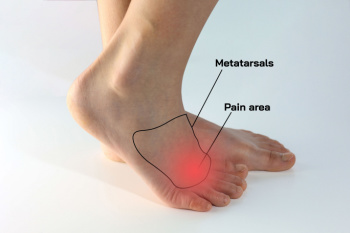
Morton's neuroma, also known as interdigital neuroma, is a painful condition that affects the nerves between the toes, most commonly between the third and fourth toes. Named after Dr. Thomas George Morton, this condition causes sharp, burning pain, tingling, or a feeling of having a lump in the ball of the foot. The pain often worsens when wearing tight shoes or during activities like walking or running. The cause of Morton's neuroma is usually excessive pressure on the nerve, often due to wearing ill-fitting shoes, high heels, or repetitive stress from activities. Risk factors include foot deformities like bunions or flat feet. Treatment typically starts with conservative measures, such as wearing adequately cushioned shoes, and using orthotics, or corticosteroid injections. If these do not relieve symptoms, surgical excision of the neuroma has shown promising long-term results in reducing pain and improving function. If you are experiencing symptoms of Morton's neuroma, it is suggested that you schedule an appointment with a podiatrist for proper diagnosis and treatment.
Morton’s neuroma is a very uncomfortable condition to live with. If you think you have Morton’s neuroma, contact Dr. Richard Silverstein of Union Foot Care. Our doctor will attend to all of your foot care needs and answer any of your related questions.
Morton’s Neuroma
Morton's neuroma is a painful foot condition that commonly affects the areas between the second and third or third and fourth toe, although other areas of the foot are also susceptible. Morton’s neuroma is caused by an inflamed nerve in the foot that is being squeezed and aggravated by surrounding bones.
What Increases the Chances of Having Morton’s Neuroma?
- Ill-fitting high heels or shoes that add pressure to the toe or foot
- Jogging, running or any sport that involves constant impact to the foot
- Flat feet, bunions, and any other foot deformities
Morton’s neuroma is a very treatable condition. Orthotics and shoe inserts can often be used to alleviate the pain on the forefront of the feet. In more severe cases, corticosteroids can also be prescribed. In order to figure out the best treatment for your neuroma, it’s recommended to seek the care of a podiatrist who can diagnose your condition and provide different treatment options.
If you have any questions, please feel free to contact our office located in Havre de Grace, MD . We offer the newest diagnostic and treatment technologies for all your foot care needs.
